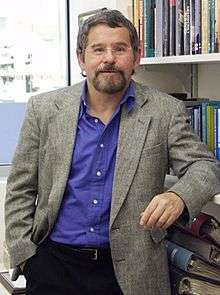Joseph Wang
| Joseph Wang | |
|---|---|
 Joseph Wang | |
| Born | 1948 |
| Nationality | USA |
| Scientific career | |
| Fields | Nanotechnology, Nanomachines, Electrochemistry, Biosensors |
| Institutions | University of California, San Diego |
Joseph Wang is an American researcher and inventor. Wang is Distinguished Professor, SAIC Endowed Chair,[1] and Chair of the Department of Nanoengineering at the University of California, San Diego specializing in nanomachines, biosensors, nanobioelectronics, wearable devices, and electrochemistry. He also serves as the Director of the Center for Wearable Sensors[2] at the University of California, San Diego.
Biography
Joseph Wang studied chemistry at the Technion and was awarded the BSc degree in 1972 and an MSc degree in 1974. After completing his D.Sc. at the Technion in 1978, he served as a postdoctoral research associate at the University of Wisconsin, Madison. In 1980, he joined the Department of Chemistry and Biochemistry at New Mexico State University, where he became a Regents Professor and holder of the Manasse Chair.
Wang founded the journal Electroanalysis (Wiley-VCH) in 1988 and has been Editor-in-Chief ever since. In 2004-2008, he served as the Director of the Center for Bioelectronics and Biosensors at the Biodesign Institute and as a Professor of Chemical Engineering and Chemistry at Arizona State University (ASU). Since 2008, Wang has served as Distinguished Professor of Nanoengineering at the University of California, San Diego, and as Department Chair since 2014.
Fields of research
Joseph Wang's earlier research focused on electrochemical biosensors and detectors for clinical diagnostics and environmental monitoring, with particular emphasis on blood glucose monitoring for diabetes management. Wang's current research interests include the development of nanomotors and nanomachines, wearable non-invasive sensors, electrochemical biosensors,[3] bioelectronics, microfluidic (“Lab-on-a-Chip”) devices, and remote sensors for environmental and security monitoring. His contributions in these directions have been of major impact in the development of electrochemical sensing techniques and man-made nanomachines. He was ranked the ‘Most Cited Researcher in Engineering’ during 1997 - 2007, as well as the ‘Most Cited Chemist’ in ISI’s lists of ‘Most Cited Researchers in Chemistry’ for the same period and of '2015 World's Most Influential Scientific Minds'. Joseph Wang has authored 1040 research papers, 11 books, 25 patents, and 35 chapters.His publications have been cited over 98,000 times and his H-Index (Google Scholar) is 154. His books include: "Stripping Analysis" (VCH-1985), "Analytical Electrochemistry" (Wiley 2006) and "Nanomachines" (Wiley-VCH 2013). Over 40 Ph.D. candidates and 250 post-doctoral fellows have collaborated with Wang.
Wang led a team that successfully merged efforts in the fields of biosensors, bioelectronics and nanotechnology to fashion nanocrystals that can act as amplifying tags for DNA or protein biosensors. This creates enormous potential for applications for early disease diagnosis. Wang's work in the field of nanomachines, involving novel motor designs and applications, has led to the world fastest nanomotor, first demonstration of nanomotor operation in living organism, to a novel motion-based DNA biosensing,[4] and nanomachine-enabled isolation of biological targets, e.g. cancer-cell isolation and to advanced motion control in the nanoscale. He has also pioneered the use of body-worn printed flexible electrochemical sensors and biofuel cells (including textile and epidermal-tattoo devices), microneedle-based electrochemical biosensors for real-time, pain-free quantification of circulating metabolites and electrolytes, 'green' bismuth electrodes for sensing toxic metals and remote submersible devices for continuous environmental monitoring.
Published books
- Analytical Electrochemistry (3rd Ed, 2006)
- Biosensors and Chemical Sensors
- Biosensors for Direct Monitoring of Environmental Pollutants in Field
- Electrochemistry of Nucleic Acids and Proteins
- Electrochemical Techniques in Clinical Chemistry and Laboratory Medicine
- Stripping Analysis: Principles, Instrumentation, and Applications
- Electrochemical Sensors, Biosensors and their Biomedical Applications
- NanoBiosensing
- Nanomachines: Fundamentals and Applications (Wiley 2013)
Wang is also the Editor-in-Chief of the journal Electroanalysis.[5]
Awards
- Regents Professorship, New Mexico State University
- Manasse Chair, New Mexico State University
- Heyrovsky Medal, Heyrovsky Institute, Prague, Czech Republic, 1994.
- Honorary Professorship, National University, Cordoba, Argentina
- American Chemical Society National Award in Analytical Instrumentation, 1999 [6]
- American Chemical Society National Award for Electrochemistry, 2006 [7]
- Doctor honoris causa, Complutense University, Madrid, Spain, 2007
- Honorary Member, National Institute of Chemistry in Ljubljana, Slovenia, 2007
- Fellow, American Institute for Medical and Biological Engineering, 2010[8]
- Honorary Professor - University of Science and Technology Beijing, 2011
- Doctor honoris causa, Alcala University, Alcala, Spain, 2011
- Bruno Breyer Medal of the Royal Australian Chemical Institute, 2012 [9]
- Spiers Memorial Award of the UK Royal Society of Chemistry, 2013
- Fellow, Royal Society of Chemistry, 2013
- SAIC Endowed Chair, University California San Diego, 2014.
- Honorary Professor - Fudan University, PR China, 2016
- Sir Louis Matheson Distinguished Visiting Professor, Monash University, 2015-2018
- Honorary Professor - Charles University, Prague (Czech. Republic), 2017
- Honorary Professor - UMF, Cluj (Romania), 2017
- Honorary Professor - Comenius University, Bratislava (Slovakia), 2018
- Czech National Academy of Sciences- Heyrovsky Honorary Medal, 2018
- European Society of Electroanalytical Chemistry (ESEAC) Lifetime Achievement Award, 2018.
- Electrochemical Society, Sensor Achievement Award, 2018.
References
- ↑ "NanoEngineering Professor Joseph Wang Appointed to SAIC Endowed Chair in Engineering at UC San Diego". University of California, San Diego. 2014-11-25. Retrieved 2018-07-15.
- ↑ http://www.jacobsschool.ucsd.edu/wearablesensors/
- ↑ Wang, Joseph (2008). "Electrochemical Glucose Biosensors". Chemical Reviews. 108: 814–825. doi:10.1021/cr068123a.
- ↑ Nature Comm. Motion-based DNA detection using catalytic nanomotors
- ↑ "Electroanalysis". Wiley Online Library. Retrieved 2018-07-15.
- ↑ DAC Award in Chemical Instrumentation, ACS Division of Analytical Chemistry, American Chemical Society. Accessed July 15, 2018
- ↑ Award in Electrochemistry, ACS Division of Analytical Chemistry, American Chemical Society. Accessed July 15, 2018
- ↑ http://nanoengineering.ucsd.edu/node/2 Professor Joseph Wang receives AIMBE Fellow, Department of NanoEngineering, UC San Diego. Accessed July 15, 2018
- ↑ Electrochemistry Division Medals, EDRACI: Electrochemistry Division of the Royal Australian Chemical Institute. Accessed July 15, 2018